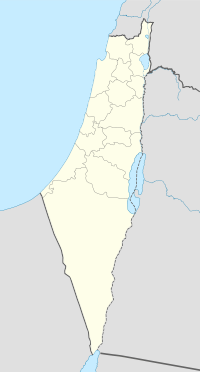Meiron
Tampilan
- Unduk desa Israel modern, lihat Meron, Israel.
Meiron
ميرون Mirun, Meron, Meroon, Marun, Meirun, Mairun | |
|---|---|
Desa | |
| Koordinat: 32°58′56″N 35°26′17″E / 32.98222°N 35.43806°E | |
| Palestine grid | 191/265 |
| Entitas geopolitik | Mandat Palestina |
| Subdistrik | Safad |
| Tanggal pengosongan | 10–12 Mei 1948[1] |
| Luas | |
| • Total | 14,114 dunams (14,114 km2 or 5,449 sq mi) |
| Populasi (1945) | |
| • Total | 290 |
| Sebab pengosongan | Pengaruh kejatuhan kota terdekat |
| Wilayah saat ini | Meron[2] |
Meiron (bahasa Arab: ميرون, Mayrûn; Ibrani: מירון הקדומה) adalah sebuah desa Palestina, yang berjarak 5 kilometer (3,1 mi) dari barat Safad. Berkaitan dengan kota Kanaan kuno Merom, penggalian di situs tersebut menemukan reruntuhan dari zaman Helenistik dan Romawi Awal. Reruntuhan tersebut meliputi sinagoge abad ke-3, dan Meiron dijadikan sebagai pusat keagamaan lokal berpengaruh pada masa itu.[3]
Sejak abad ke-13, Meiron menjadi situs populer bagi para peziarah Yahudi.[3][4]
Referensi
Daftar pustaka
- Aharoni, Y.; Rainey, A. (1979). The Land of the Bible: A Historical Geography. Westminster John Knox Press. ISBN 9780664242664.
- Barron, J.B., ed. (1923). Palestine: Report and General Abstracts of the Census of 1922. Government of Palestine.
- Benjamin Ben Jonah of Tudela (1841). Adolf (Abraham) Asher, ed. The Itinerary of Rabbi Benjamin of Tudela.
- Bromiley, G.W. (1995). The International Standard Bible Encyclopedia: A-Z. Wm. B. Eerdmans Publishing. ISBN 9780802837851.
- Conder, C.R.; Kitchener, H.H. (1881). The Survey of Western Palestine: Memoirs of the Topography, Orography, Hydrography, and Archaeology. 1. London: Committee of the Palestine Exploration Fund.
- David, Avraham (1990). "The Jewish Settlement in Palestine at the Beginning of the Ottoman Empire (1517-1599)". Dalam Alex Carmel, Peter Schäfer and Yossi Ben-Artzi. The Jewish Settlement in Palestine 634-1881. Wiesbaden: Dr. Ludwig Reichert Verlag.
- Department of Statistics (1945). Village Statistics, April, 1945. Government of Palestine.
- Fine, S. (2005). Art and Judaism in the Greco-Roman World: Toward a New Jewish Archaeology. Cambridge University Press. ISBN 9780521844918.
- Friedland, Roger; Hecht, Richard D. (1996). To Rule Jerusalem
 . Cambridge University Press. ISBN 9780521440462.
. Cambridge University Press. ISBN 9780521440462. - Groh, D.E. (1989). E. Livingstone, ed. Papers Presented to the Tenth International Conference on Patristic Studies Held in Oxford 1987. Peeters Publishers. ISBN 9789068312317.
- Hadawi, S. (1970). Village Statistics of 1945: A Classification of Land and Area ownership in Palestine. Palestine Liberation Organization Research Center.
- Herzog, C. (1982). The Arab-Israeli Wars. War and Peace in the Middle East. Arms and Armour Press. ISBN 0-85368-367-0.
- Horden, P.; Purcell, N. (2000). The Corrupting Sea: A Study of Mediterranean History. Blackwell Publishing. ISBN 9780631218906.
- Hütteroth, Wolf-Dieter; Abdulfattah, Kamal (1977). Historical Geography of Palestine, Transjordan and Southern Syria in the Late 16th Century. Erlanger Geographische Arbeiten, Sonderband 5. Erlangen, Germany: Vorstand der Fränkischen Geographischen Gesellschaft. ISBN 3-920405-41-2.
- Karmon, Y. (1960). "An Analysis of Jacotin's Map of Palestine" (PDF). Israel Exploration Journal. 10 (3,4): 155–173; 244–253. Diarsipkan dari versi asli (PDF) tanggal 2019-12-22. Diakses tanggal 2020-07-15.
- Khalidi, W. (1992). All That Remains: The Palestinian Villages Occupied and Depopulated by Israel in 1948. Washington D.C.: Institute for Palestine Studies. ISBN 0-88728-224-5.
- Meyers, C.; Meyers, E. "Eric M. and Carol L. Meyers Papers, 1970 - 1980". University Archives, Duke University. Diakses tanggal 2008-12-19.
- Mills, E., ed. (1932). Census of Palestine 1931. Population of Villages, Towns and Administrative Areas. Jerusalem: Government of Palestine.
- Morris, B. (2004). The Birth of the Palestinian Refugee Problem Revisited. Cambridge University Press. ISBN 978-0-521-00967-6.
- Nazzal, Nafez (1978). The Palestinian Exodus from Galilee 1948. The Institute for Palestine Studies. ISBN 978-0-88728-128-0.
- Negev, A.; Gibson, S. (2005). Archaeological Encyclopedia of the Holy Land. Continuum International Publishing Group. ISBN 9780826485717.
- Oliphant, L. (1887). Haifa, or Life in Modern Palestine. archive.org.
- Pringle, Denys (1997). Secular Buildings in the Crusader Kingdom of Jerusalem: An Archaeological Gazetteer. Cambridge University Press. ISBN 9780521460101.
- Rhode, H. (1979). Administration and Population of the Sancak of Safed in the Sixteenth Century (Tesis PhD). Columbia University. https://www.academia.edu/2026845/The_Administration_and_Population_of_the_Sancak_of_Safed_in_the_Sixteenth_Century.
- Robinson, E.; Smith, E. (1841). Biblical Researches in Palestine, Mount Sinai and Arabia Petraea: A Journal of Travels in the year 1838. 3. Boston: Crocker & Brewster. (pp. 333 ff, 367, 2nd appendix, p. 134)
- Robinson, E. (1856). Later Biblical Researches in Palestine, and in the Adjacent Regions: A Journal of Travels in the Year 1852. Drawn Up from the Original Diaries, with Historical Illustrations, with New Maps and Plans. Crocker & Brewster.
- Safrai, Z. (1998). The Missing Century: Palestine in the Fifth Century : Growth and Decline. Peeters Publishers. ISBN 9789068319859.
- Schumacher, G. (1888). "Population list of the Liwa of Akka". Quarterly statement - Palestine Exploration Fund. 20: 169–191.
- Stemberger, Günter; Tuschling, Ruth (2000). Jews and Christians in the Holy Land: Palestine in the Fourth Century. Continuum International Publishing Group. ISBN 9780567086990.
- Urman, Dan; Flesher, Paul Virgil McCracken (1998). Ancient Synagogues: Historical Analysis and Archaeological Discovery. BRILL. ISBN 9789004112544.
- Vilnay, Z. (2003). Legends of Palestine. Kessinger Publishing. ISBN 9780766141285.
- Zangenberg, Jürgen; Attridge, H.W.; Martin, D. (2007). Religion, Ethnicity, and Identity in Ancient Galilee: A Region in Transition. Mohr Siebeck. ISBN 9783161490446.
Pranala luar
- Welcome to Mirun, Palestine Remembered
- Mirun, Zochrot
- Survey of Western Palestine, Map 4: IAA, Wikimedia commons
- Mirun, from the Khalil Sakakini Cultural Center
- Mirun, Dr. Khalil Rizk
- Miroun photos from Dr. Moslih Kanaaneh

